Becky Keife is a beloved speaker and is the Community Manager for DaySpring’s (in)courage, a widely followed online community where authentic women link arms to build community, celebrate diversity, and live courageously for Jesus. She talks openly about finding God in the midst of her own battle with anxiety, and I know you’re going to love our conversation today.
In this episode, Becky helps us understand what our children are thinking and experiencing when they are dealing with anxiety, and how that knowledge can help us as parents be filled with compassion and know better how to help them.
To read today’s episode scroll down to the end of this post.
Today’s show is brought to you by our newest prayer guide, Praying God’s Word for Your Child’s Anxiety
Links mentioned in this episode:
This post contains affiliate links. When you purchase through this link, you help support Million Praying Moms at no extra cost to you. Thank you!
Grace to Grow: A 5-Day Study of Patience and Prayer
Praying God’s Word for Your Child’s Anxiety
Becky Keife Interview Episode #47
Subscribe & Review in iTunes
Have you subscribed to the Million Praying Moms Podcast? If not, why don’t we fix that right away! We don’t want you to miss even one! Click here to get that taken care of!
And if you’re feeling extra special generous, we would be so grateful if you took the time to leave a brief review. These help other people find the Million Praying Moms Podcast (and they encourage us to keep going)! Just click here to review, select “Ratings and Reviews” and “Write a Review” and then let us know what you love about the podcast! Thank you!
Read Today’s Podcast Episode
Brooke
Hey friends, I don’t know about you, but I have learned so much already this month about recognizing anxiety in our kids. Not only that, but I hope you feel more empowered by the research to help your kids, or maybe even to help your kids’ friends as they struggle. Today, after hearing from Sissy Goff about anxiety in girls and Dr. Gregory Jantz about anxiety in boys, I thought it might be nice to hear from a mom herself who struggles with anxiety. That’s why I invited Becky Keefe to join us. Becky is a beloved speaker and is the community manager for DaySpring’s Encourage, a widely followed online community where authentic women link arms to build community, celebrate diversity, and live courageously for Jesus. The author of several books, Becky and her husband live near Los Angeles where they enjoy hiking shady trails with their three-spirited sons. She talks openly about finding God in the midst of anxiety and I know you’re going to love our conversation today.
Becky, welcome to the show. I am so glad to have you. You actually have been on the Million Praying Moms show before. It’s been a long time ago…I believe it was maybe your first book came out. You came and talked to us about all things mom and how God made us to be the mom for our kids. And that was such a great episode. I’ll link to that in the show notes so that if anybody wants to go and listen to that they can. But it’s been a little while, so I would love it if you would just refresh our memory, tell everybody a little bit about yourself and your ministry and your family, help them get to know you.
Becky Keife
Yeah, well thanks. It’s so good to be back with you, Brooke. I am Becky Keife. I am a mama to three hungry growing boys. My boys are now 11, 13, and 14. We live here in Southern California. My husband and I have been married for 18 years and I am the Community and Editorial manager for Incourage, which is a DaySpring community. So I love the work that I get to do there.
And like you mentioned, my first book was about motherhood, No Better Mom for the Job, and I’ve written subsequent books and Bible studies. And one thing that we’re going to talk about today that is really a passion of mine is bringing the struggle of anxiety out of the darkness of isolation and into the light of God’s truth, as well as our shared experience. And so that’s a lot of the kind of of ministry and sharing that I do on Instagram, which is one of my favorite places to hang out.
Brooke
Yeah, it’s mine too. I love to watch what you’re doing there. I really appreciate the way that you are, like you said, kind of shining the light on this particular issue. This entire month on Million Praying Moms has been about anxiety. We have discussed what it looks like in girls with Sissy Goff. We have discussed what it looks like in boys with Dr. Gregory Jantz, because there are some similarities, but also differences in the way boys and girls present with anxiety. But I also have a personal reason for wanting to talk to you and that is because I have a dear, dear friend who suffers with anxiety and she is just always on my heart. I have watched her struggle through this and so I’m really anxious to hear your story and I want to learn from you. And I think that a lot of the moms who are listening are going to really just. soak up what you have to say because not only, you know, it may not only just help them, other moms who might be struggling with anxiety, but I think it’s going to help them understand their children who struggle with anxiety a little bit better as well, especially if they don’t themselves handle or struggle with anxiety.
Sometimes if you don’t struggle with it, it can be hard to have compassion. There’s this this idea that, well, you should just be able to get over this. Like, this is not rational. Just get over it. And it isn’t that easy. It isn’t that simple. I’ve learned that from watching my friend go through it. And so I’m just thrilled to have you with us today. And I think that the best place for us to start is just for you to tell us your story. When did you first start experiencing anxiety and how did it develop to the point where you really feel the freedom to just, you know, talk about it and, and where you are now.
Becky Keife
Yeah. Well, from the get-go, I find that it’s helpful to have some shared language when we’re talking about anxiety, because I think one of the difficulties in having these kinds of conversations is that we actually use the word anxiety to describe an entire spectrum of experiences from like everyday stress and worry. Like, you know, I’m anxious about this upcoming trip or about a test at school…all the way to a clinical diagnosis of a mental disorder, anxiety. And so there’s parts of anxiety that is common to all people. We all experience stress. We all can experience levels of overwhelm and worry. And then there’s a kind of anxiety that sounds like you’re saying, Brooke, with your friend, that is not common to all people. And it is very difficult to understand what that experience is like when you yourself haven’t had it. And so I think, Brooke, what you’re asking me today is to talk more about like my anxiety experience with someone who’s diagnosed with clinical anxiety.
But I want to tell you that I think there’s things that we’re going to talk about that are helpful no matter where we are, you know, on this spectrum. And also like how do we understand God’s Word and what, you know, what the Bible says, do not be anxious about anything. Well, is he talking about like don’t have a mental illness? No, that’s more like the everyday worry, stress, trying to control our lives. So I just think from the get-go, that’s helpful. But when I think about my… And does that make sense, Brooke?
Brooke
Absolutely, absolutely. So my, I don’t know if you know this, Becky, but my background is in counseling, psychology and counseling. I have a master’s in counseling. Yeah, and so I really think that was super helpful. Thank you for putting that in there because I have personally talked really openly the last two books that I have released, they were prayer journals and one was called Everyday Prayers for Peace and one was called Everyday Prayers for Patience. And within those two books, I talk a lot about a season of anxiety for myself that I went through and how I found hope in God’s Word for that, but I still don’t think it’s the same thing as what you’re going to talk to us about today. And I don’t think it’s the same thing that we’ve been talking to Sissy Goff about or Dr. Jantz about. This is an entirely different thing. And so I’m really grateful that you clarified that because I think it’s very helpful. So absolutely.
Becky Keife
Good, thank you. So I would say probably about eight, almost nine years ago, I got to a place in my life where I was very not okay. And I’m the kind of person that I have believed, whether because people told me or just because of how I am wired as an achiever, like if I just did more, tried harder, was a better Christian, managed my time better you know, was more thankful that I could fix myself essentially. But I found myself in a season with three young kids and I was barely making it through the day in terms like, but in such a way that I was, I was crumbling on the inside, but most people on the outside wouldn’t have thought anything, but I would find myself every night standing at my kitchen sink doing dishes. And I felt like I couldn’t breathe, Brooke. Like I would try to take deep breaths and I felt like I couldn’t fill my lungs with enough air. My mind was racing and I would have these like almost, it sounds so bizarre to try to explain, but like this dissociative experience where it’s like my mind was racing and yet part of my logical brain could be like, Becky, you are fine. Like everything is fine. There’s nothing wrong that’s happening. And yet there was like this dueling, just experience going on within my body and my mind. Any mom deals with irritability, right? Like our kids can annoy us, we get tired. And yet anxiety can be this very heightened irritability where I was reacting out of a place of sensory overload, of…cognitive and emotional deficit where I could be like, I don’t want to be like this. And it was like, I was not fully in control of what was going on in my body and my mind.
And I remember a lot quite a while before this, a friend, and this is why it’s so important to talk about a friend had told me about her experience with anxiety. And at the time I didn’t fully resonate, but it came back to me these years later and I called Christy on the phone and I remember telling her like, I think one, I know I’m not okay. And I think that this is what I’m struggling with. And she’s like, tell me, tell me how it feels. And as I share these things with her, she was like, Becky, you’re not crazy. You’re not alone, but you do need support, you do need help. Like this is real. And, but Brooke, it took me a long time to first get honest with myself about it, then to get honest with God, and then finally to even open up, even to my husband. And I remember we were on a drive and I told him like, I think I’m struggling with anxiety. And he was like, yeah, I can tell like, you’re not okay. And at that point in our marriage, like mental health wasn’t something that we talked about. It wasn’t something that I felt like he was really open to understanding. And so it was a very scary thing to disclose. Like, I don’t know why this is happening. I don’t know how to fix it. But looking back, I’m so grateful for that conversation with my friend and then that conversation with my husband that really set me on this journey of being like, I don’t have to keep struggling alone. I don’t have to keep piling on the shame of what I couldn’t even name at the time. And so that really ignited, set me on a journey of going to counseling and seeing a really good Christian therapist and not only learning coping strategies, but kind of digging into things from my past and past trauma, which I learned can have a lowercase t.
I didn’t have to have some, you know hugely traumatic childhood with abuse. There are things in my life that were still causing these roots of anxiety to manifest in my life. And so after lots of therapy and there’s been different stages of my anxiety over these past many years, but I can also look back and see, I struggled with this as a kid. This has always been part of my wiring and my…chemical disposition, but I didn’t have language for it. My mom didn’t have language for it. And so now I’m so grateful that you are bringing this conversation to moms because one, we struggle ourselves, but two, we can be more attuned to what may be going on with our kids and be better equipped to come alongside them.
Brooke
Yeah, let me, I picked up on something that you said that is not a part of our script for today, but I’m gonna go off just for a second, because I think it’s important. And that is you mentioned the word shame. And I want to understand better why there is shame. Why is there so much shame around the issue of anxiety at this level? Why does that shame keep us in some cases from getting help that we need, either for ourselves or for somebody that we love.
Becky Keife
I think the shame can come from a lot of different places. For me, there is shame in feeling like, I can’t explain to you why this is happening in me. And I feel like we have this onus on ourselves to be like, it’s not legitimate if I can’t explain it. I have learned that one of my anxiety triggers, and it was kind of the thing that like brought me to this really desperate place, is what I call empathy overload.
Like I am such an empathetic person that at the time when my anxiety got, you know, to this really breaking point for me, I could look at my life and be like, for the most part, everything’s fine. Not perfect, but like, you know, my family’s intact. I have healthy kids. Like God is providing financially for enough of what we need. But I had multiple people in my life, sisters, a dear friend, someone who had passed away like…all these areas where other people in my life were going through intense trials, seasons of crisis after crisis, there was this just blanket of grief. And I realized that I was internalizing all of that to the point where it was triggering this intense anxiety response. But you know, for example, my husband who was very well-meaning, he was like, Becky, you can’t control what’s happening in your sister’s life. Like you have to let it go.
Someone could tell me that, but that wasn’t changing the way my brain was processing this grief. And so I think, but it felt shameful to be like, okay, I know what you’re saying and I can logically even tell myself, don’t worry about it. Just let it go. Or you don’t have control over this. You can’t fix it. And yet that wasn’t enough to move me back to a place of regulated normalcy. And that feels shameful. It feels like…I should be able to fix myself. And when that’s not possible, it’s hard to say, I need help, I can’t fully explain what’s happening within me. I can’t make you understand all of the reasons, but we need to get to a place as women in our own selves, as mothers, as sisters, as friends to be like, you don’t have to fully explain it in order for it to be legitimate.
Brooke
Mm-hmm. Yeah, that’s such a great explanation. I think it’s really insightful to say that we understand that there’s a problem. And part of the problem is that we feel like we can’t fix the problem. And that is where some of that shame comes from. Like I should I know I had a friend one time who dealt with depression, clinical depression, and she explained it to me this way. One time she said. I can look around and I can see all of the amazing things that God’s given me in my life. Like you were just explaining, I have a nice home, my husband has a good job, I get to parent my children the way I want to, I have three healthy children, I have enough money to put food on the table, all these great blessings, everything that I really wanted for my life, God has allowed me to have. There is no reason for me to feel depressed and I feel guilt and shame because I know I shouldn’t, but I do, and I can’t fix it. So it seems like there’s like that’s a similar thing that, you know, between depression and anxiety. So with that in mind, what I would like to do is spend a little bit of time helping the moms that are listening, whose children are suffering from anxiety, understand what it might feel like for their child and what things they could look for that would help them to know when their child needs help. So for the mom who is not experiencing anxiety or has never had anything beyond maybe what I experienced in my, like a season of anxiety, help her understand her child a little bit better.
Becky Keife
Yeah. Well, again, I’m going to say, and it’s not going to sound very helpful, but it’s worth saying is that anxiety really does look different for everyone. And you brought up depression. And the way my therapist described it is like anxiety and depression are like two sides of the same coin. And so for me, like part of my anxiety, which is more like the depressive side can look like sadness that doesn’t match my circumstances. Like I can just feel this, like, like it feels like like a lead blanket, like at the dentist office, you know, that I’m like, I should be able to take this off and yet I can’t. And like your friend was saying, like, I can check all the boxes of blessings and yet I just feel sad. So I want to say anxiety does look different for everyone. I would say we need to pay attention to when our kids are operating or responding, reacting outside of their normal outside of their typical responses. So for example, I can look back and be like, that was anxiety I didn’t have the words for at the time. But as a kid, I remember I started complaining of really severe backaches. And I was like a rough and tumble kind of little girl. Like I would go outside and come back in bloody from like running through the rose bushes. And so when I started complaining of backaches, my mom’s like, you’re not just making this up.
But like there was nothing physically wrong with me. Like we had to test, we did x-rays, the doctors couldn’t find anything. And then one insightful doctor switched from asking about my physical health to my emotional and mental health and was like, is there something especially stressful going on at home? And my mom was like, actually, yeah, my parents were in the middle of a divorce and my body was literally storing my stress. So things like that. So, if your child suddenly used to be fine getting ready for school or fine doing their bedtime routine and now there is a huge shift in how they are responding, that could be a sign of anxiety. A heightened or exasperated fear of failure or fear of disappointing people, those can be signs of anxiety. For me, I was always a really high achieving kid and yet my perfectionism was a signal of my anxiety. I remember my mom in high school, I was upstairs and she was downstairs and it was probably closing in on midnight and her yelling, go to bed, take the B. And I was like, no, like that was, that could also be my Enneagram three. But I think there was, that is a symptom. But then I would get to that tipping point where my nervous system was like enough, enough striving, enough trying to control with your anxiety and then I would become paralyzed with overwhelm. I’d become incapable of tasks that I know I’m capable of doing. You know if your child says something like I can’t, it’s hard to breathe, it probably is. You know if they, if they say things like you know my mind just can’t shut off. I had a child who went through a series of crying every night over something that had happened months and months ago that was like, logically would be like, not worth crying about. Like, you’re not, we got over that. Like, it’s, it’s been processed, it’s been dealt with. Well, his mind was reverting back to something that was help was giving him not really appropriate language, but a response to express the anxiety that he was dealing with. Sensory sensitivity can be another trigger of anxiety. That was true for me as a child and as an adult. I will frequently tell my kids, you’re not being bad, but mommy’s brain right now cannot handle the volume with which you are speaking, talking, playing, whatever. So if you’re not feeling good, you’re not feeling good.
You know, if your kid is like, I can’t, it’s too much, they can’t handle those sounds, they can’t handle, you know, the feel of something on their skin. Again, it’s not always clinical anxiety, but those could be signs to look for.
Brooke
Okay, that’s really insightful. I think, again, it’s interesting to me because I can see some of as someone who has again dealt with seasons of anxiety or circumstances that brought on more anxiety than I normally experience. I can see a little bit of that in my own, you know, in that experience for me, like, one of the things that I experienced a lot was an elevated heart rate. I have an Apple watch and it would, my heart rate would go up to 140, 150, and it would start dinging and saying, your heart rate is too high, your heart rate is too high. Like there’s physical things that would happen to me in the midst of that, that as an adult I can recognize. But as a child who may or may not have an Apple watch, right, they don’t necessarily understand that their heart rate is high when they start to feel dizzy or when they start to feel a little shortness of breath or when their mind feels a little bit swimmy in the midst of like, those are things that happen when your heart rate gets high. They may not necessarily understand that, but as a mom, when your child starts to exhibit that a little bit, then you can have an understanding of what that looks like and maybe how to help them with that, with coping exercises and things like that. So I just think it’s really important for us to know what signs to look for, because the reality is that, at least if the news is correct, the reality is that our kids are facing epidemic levels of anxiety these days. And I don’t know if we fully understand why. I think there are some obvious reasons. I think certainly COVID, their experience of COVID plays into that.
I think their social media use plays into that. Those are things that you and I didn’t necessarily have to deal with when we were teenagers, right? That was not a part of our shared experience or history, but they are having to deal with that in ways that we never did. But beyond that, even beyond those two things, there’s some question mark about why this is happening in today’s culture, but it is happening. So we can question it all we want to but the reality is that it is happening. And so as moms, we have to be looking for it in both our sons and our daughters. So I appreciate that. I know that one of the distinctions that you made was that the verse in Philippians that says be anxious for nothing, that is not necessarily God saying don’t have clinical anxiety. That is not God saying you’re sinning if you need to go to a counselor or your anxiety that is diagnosed and that you need medication for, that’s not a sin. It’s more the everyday things that God wants us to be able to give him control of so that we don’t experience that kind of anxiety. And I appreciate that distinction. What are some other things though, from God’s word, knowing that there isn’t necessarily a way that we can look in our concordance and find a verse that fixes what we’re talking about today. Understanding that there is no verse that talks necessarily about how to fix this. What are some truths from God’s Word that do help you in spite of that? What are some things that you might speak over yourself in the moment or when you’re struggling that help point you back to a place of peace from God’s Word?
Becky Keife
Yeah, I mean, I go back again and again to the Psalms that just affirm that God hears my prayers. I love Psalm 18:6, for example. I called to the Lord in my distress. I cried to my God for help. From his temple, he heard my voice. My cry to him reached his ears. So whatever we’re struggling that God promises that we can call to him in our distress. And so, you know, there are times, there are seasons where I’m doing pretty good. I, you know, I’m doing my coping strategies. I do take medication and those things help. And then even with those things and even with all the healing I’ve done in therapy, like I will have, you know, I will have triggers. I will have, you know, a fresh wave, a fresh, intense season and to know that like God sees me in my distress and he hears my cries. That is a…a huge comfort. I also go back again and again to Matthew 11:28, where Jesus says so clearly, come to me all who are weary and burdened and I will give you rest. And just that assurance that Jesus isn’t, he never says to anyone, come to me after you fix your problems or even come to me after you understand your issues. No, he just says, are you weary? Are you burdened?
And I often feel so weary of my anxiety, so burdened that this thing keeps, you know, feeling like some shackle, you know, in my life, in my mind at times. And I just say, okay, Jesus, I’m just gonna come to you. And I trust and believe that your promise is true and that you will give me rest for my soul even in the midst of this anxiety. And that’s the truth, friends, it can be both. You don’t have to be fully healed. And it can be, you know, this isn’t just applied to anxiety. I mean, you know, cancer, you know, heart disease, relational brokenness, like your kid is going through a learning disability, all the things that make us weary and burdened that we can come to Jesus.
And then one other one, Brooke, that I would just wanna share is the promise that anxiety does not disqualify me from God’s love or His purpose for my life. And so I think of Ephesians 2 10 that says, we are his workmanship or other translations say, we are his masterpiece created in Christ Jesus for good works, which God prepared ahead of time for us to do. And so sometimes another piece of the shame is feeling like, well, this anxiety, this mental illness is gonna disqualify me from being a good mom, from being a good wife, from being effective in my career or in ministry. And that’s not what God’s Word says. He understands that we live in a broken world. He knows our limitations, however those may manifest. And yet He still sees us as a masterpiece. Definitely a masterpiece that needs Him. Like I need Jesus every day, but I can say, okay, God, I can trust that I’m not disqualified from Your love. I’m not disqualified for you using me because we also know that God’s Word says that His power works best in our weakness. And often it’s my anxiety that makes me feel the weakest. And praise God, I’ve also seen that it’s through my anxiety that He has allowed me to comfort others with the comfort myself has received, which is living out another promise from God’s Word.
Brooke
Amen. I’m so glad you brought up the, I believe it’s in 2 Corinthians, maybe 12 verse that says that, you know, His strength is made perfect in our weakness. That’s a concept that has been so very important to me in my own motherhood. And I think it applies in motherhood. It applies in any area where we feel weak. Like, Paul says in those verses that if his weaknesses are what opens the door for God to be strong, then he’s going to boast in them. And that changed my life as a mother. I went from feeling like I had to hide behind a curtain of shame because things were not necessarily the way that I wanted everybody to think that they should be in our home. We were struggling in the early years with our kids and I was ashamed of that because like you, I’m a high achiever and I’ve always been able to reach every goal in my life by hard work and blood, sweat and tears. And here was something that for the first time I could not accomplish on my own. I could not make it be what I wanted it to be or what I thought it should be. And so my natural inclination was to cover it up, to stay home, to close the curtains on the house. Because I didn’t want anybody to know, but when I read those verses and I had read them before, but God in His mercy opened my mind and my eyes to them in that season, I felt released and compelled to just throw the curtains back because I was desperate enough for the Lord that I knew my strength wasn’t going to cut it. I had to have the strength of God. And if boasting in my weaknesses, if showing them to everybody, if no longer being ashamed of them or trying to hide them, if that was going to get me even just a little bit more of Jesus’s strength in my life, then that’s what I was going to do. And that’s exactly what happened for me. And it sounds very much like the same thing.
I think there are women listening who struggle with anxiety, who feel such shame about it as we’ve talked about. There may be moms listening who feel ashamed of their children’s struggle because they think maybe this is going to disqualify them in some way, or maybe they feel like it’s their fault that their child is struggling this way. And there’s just so, no matter what angle you come from, there is so much potential shame in this particular issue and others like it that will tempt us, I think, to close the curtains, when God says, you know, let’s open them up because my strength is made perfect in your weakness. So thank you for bringing that up. I was hoping you would mention that verse because it’s so important to me and I think it just applies to so many different things. What are some, as we wrap up, what are some practical ways that moms can serve their children who are struggling with anxiety? And I’d specifically like for you to tell us what they should not do as they’re trying to serve their children?
Becky Keife
Such good questions. Don’t tell your kids to get over it. Do help them to look at the bigger picture. Do help them to realize, it’s something I coach myself with all the time and others, like my feelings and my physical experience right now is not the whole story. It’s a very real part of the story, but it’s not the whole story. And so, we want to help our kids look at the bigger picture. And part of that is teaching them the things of God. That like, while you’re struggling, also God is right there with you. While you’re afraid or overwhelmed, God promises to be our strength and we can rely on him even when we feel weak. Don’t minimize or dismiss their experience. Hearing something like, well, it’s not that bad, right? Or there’s nothing to cry over. It’s not… Why are you like that? That’s just gonna make a kid or an adult just shut right down, right? Instead, I think a helpful tool for all of us is I find that there is a direct link between practicing gratitude and minimizing anxiety. So when my kid at the end of the day, his mind is spiraling and he’s worried about the next day you know, kind of going, I say, okay, I acknowledge that what you’re going through right now is really difficult. But that wasn’t the whole day. Right now I want you to tell me three things that you were grateful for from today. Three good things, three things that you saw that God did in your life, something like that. So I would say practice journaling. Another thing, don’t blame their anxiety on just being oversensitive. If you just weren’t so sensitive, then you wouldn’t be having a problem.
God wired each one of us on purpose. While my empathy, I mentioned, can feel like a weakness because it can trigger my anxiety, guess what? It’s also I’ve learned a beautiful strength of mine that I do empathize with people, that I can enter into someone’s pain. So, you know, if your child is, quote, overly sensitive, guess what? That might be a struggle they have to learn to cope with and to manage well, and that’s what you’re there for to support them in but God is also gonna use that in a beautiful way in their life. Number one, the way that you can support your child is ask God for wisdom. James 1:5 has been a life verse as a mom, but I think of it all the time with anxiety too, and God promises if any of you lacks wisdom, you should ask God who gives generously to all without finding fault and it will be given to you. And so just to say humbly every day, God, I don’t know what this feels like for my kid. I don’t know how to parent them well through this. I don’t know when they need a hug and when they need to say this is hard and you’re going to school. Like we need God’s wisdom for that.
Help them to practice gratitude, journaling what is known can be another really helpful tool. I had a friend whose daughter would want to rehash over and over again. Well, what’s going to happen next? And what if this happens? What if that happens? And so I encourage her, have your daughter write down what she knows. Then when she’s feeling anxious, she can go back to that. Oh, I already know this is, this is true. This is what’s going to happen and then she could write down her questions instead of this like cycle of rehashing.
And then another thing is really helpful is breathing. You can think of it, one simple technique is called box breathing or breathe the square. And you can imagine a box in your mind and you can tell your child and do it with them as you can, you know, breathe in slowly for four counts and then you hold it for four counts and you exhale slowly for four counts and then you hold for four counts. And you, if you breathe five boxes, that’s going to really help regulate that nervous system, especially if you’re having a hard time communicating with your child, you’re like, let’s pause. Let’s breathe our boxes and then start from there.
Brooke
That is so good. So helpful. I have found too that, again, not to tell everybody that they need an Apple watch, but that the breathing app on your Apple watch is also something that I have used in those moments. It will actually take you through. It sounds very similar to breathing the boxes. Like you were just saying, it’s a series of deep breaths in and deep breaths out. And I always throw, because I believe that what we smell also impacts our brain as well. I always throw in my favorite smell or maybe my favorite essential oil or something that is calming to me when I feel I’m doing those breathing exercises, which I love to do even if I’m just nervous before speaking or if I’m having to go in to meet with a teacher or you know, something that is outside of the norm, not necessarily anxiety producing, but just is making me a little bit nervous breathing those kind of deep
Breathing exercises are good for everybody. Absolutely everybody. Just getting as much oxygen to your brain as you possibly can is so helpful to be able to think clearly and feel like you’re more in control. Well, Becky, this has just been phenomenal. So, so helpful. I know that everybody is going to want to learn more about you and how they can connect with you. So as we get to the end of our time together today, maybe you could tell everybody where they can connect with you. Where are the best places for them to find you so that they can get involved with what you’re doing for the Kingdom?
Becky Keife
Thank you so much. And Brooke, I just want to say one more thing. If you feel like your child needs additional support, get them that support. Don’t be afraid or ashamed to be like, we’re going to go talk to someone. We’re going to go see a counselor. We’re going to go talk to our doctor and explain what you’ve been going through. So don’t feel like that you have to do it alone. I want to just tell the moms out there that it is not your job to fix your child or their problems, but you can let them know that you are right there with them and that together you can find healthy ways to cope and move forward knowing that God is also right there with you. So I just needed moms to hear that final word. But like I said, my favorite place online to connect is on Instagram. So I’m just @ Becky Keefe. So if you heard this episode, would you just come over and say hi, just drop me a message in my DMs or comment on one of my posts or reels. I would love to connect with you there. And then you can find me at my website at beckykeef.com and find out about my books and my Bible studies. And then I also welcome you to come over to our online community inCourage. It’s inCourage with an I, inCourage.me. And you can find more of my writing over there as well.
Brooke
Thanks, Becky.
Thanks for hanging out with me today, friends. Don’t forget to get your copy of our new prayer guide, Praying God’s Word for Your Anxious Child. You can find it and more information about Becky Keefe now in the show notes at millionprayingmoms.com. Till next time, friends, the Lord bless you and keep you. May his face shine upon you and be gracious to you. May the Lord look with favor on you and give you peace.

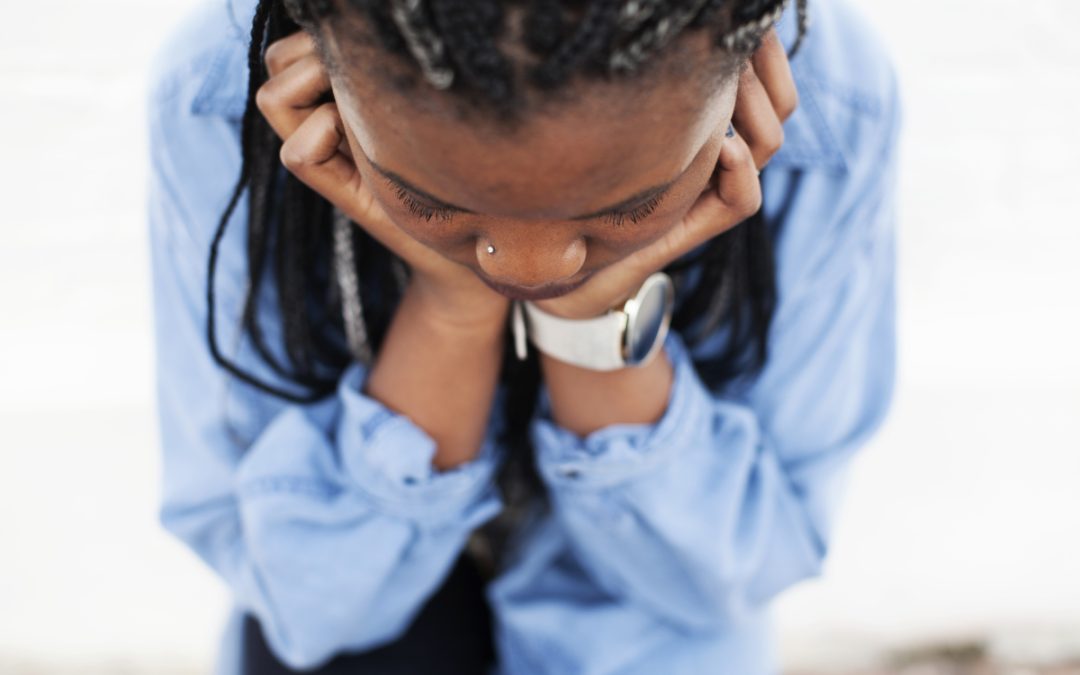
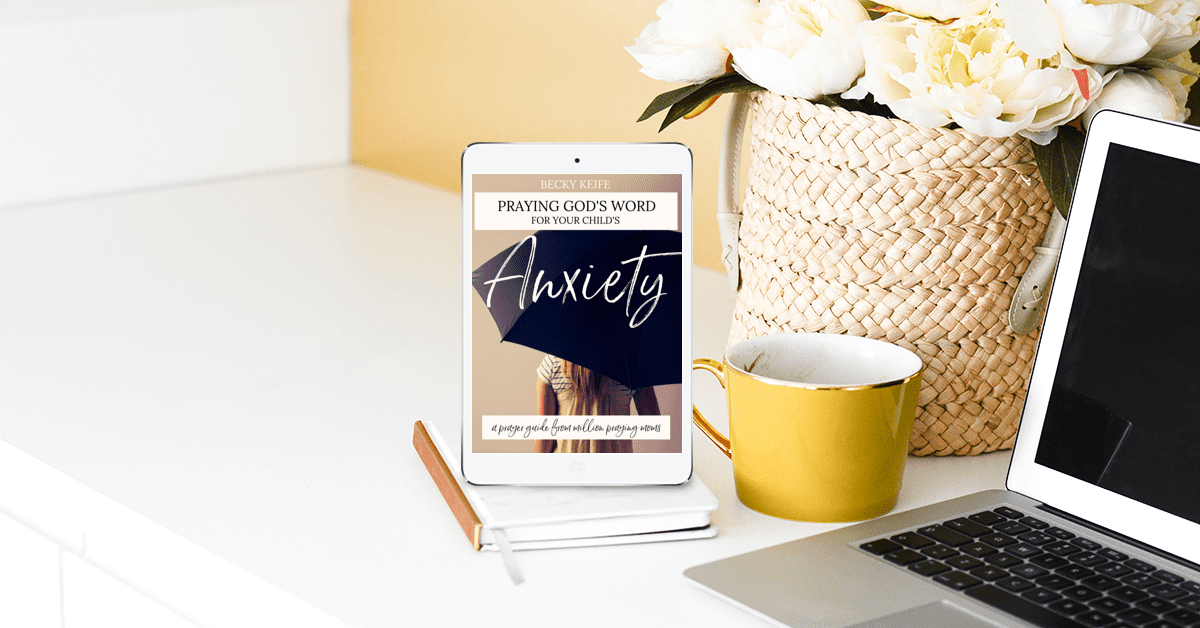

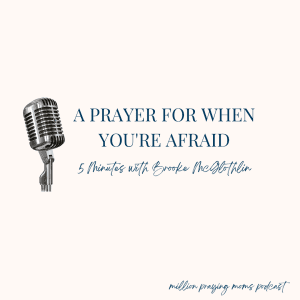

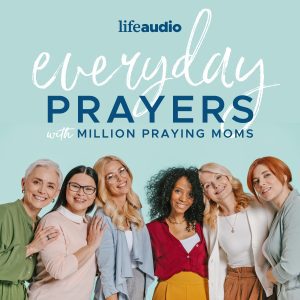
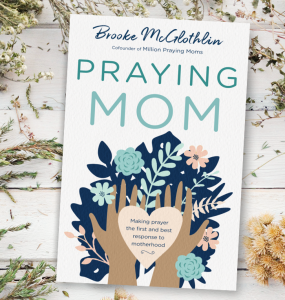
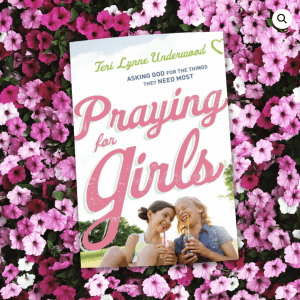
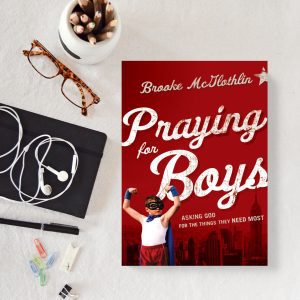
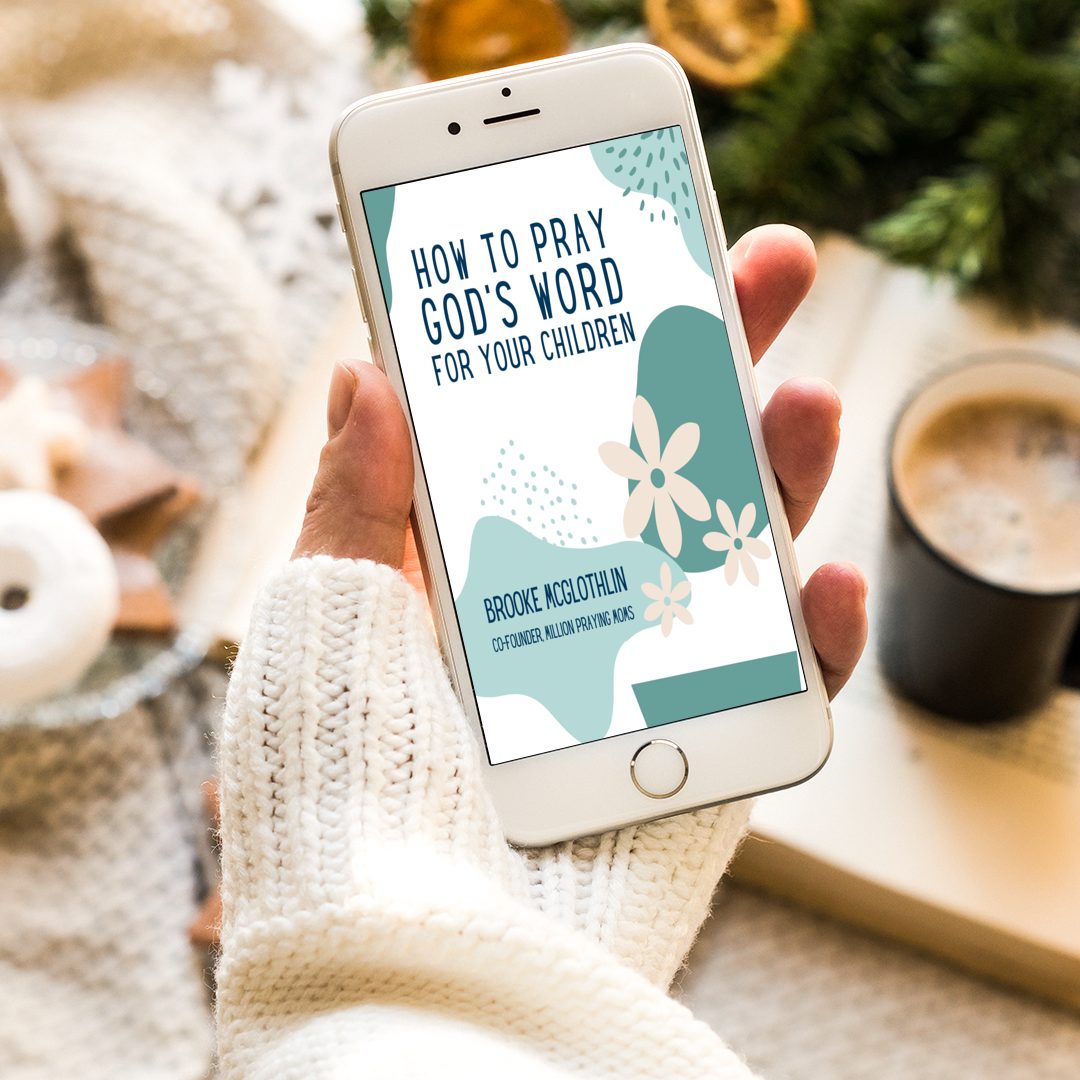
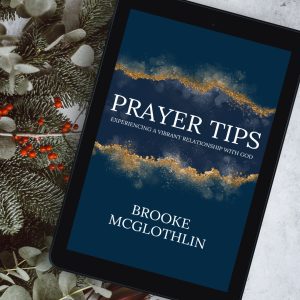
I am not on fb. So, I don’t know how to be involved.
I’m sorry, Sherry! In order for us to create the community we want with this, Facebook just gives us the best option. You can still participate if you want by purchasing the book, and following along with the master schedule. You can find it here: https://www.millionprayingmoms.com/start-with-peace-a-challenge-for-your-new-year/